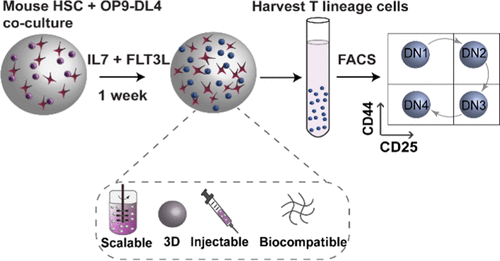当前位置:
X-MOL 学术
›
ACS Biomater. Sci. Eng.
›
论文详情
Our official English website, www.x-mol.net, welcomes your feedback! (Note: you will need to create a separate account there.)
Gelatin-Based 3D Microgels for In Vitro T Lineage Cell Generation
ACS Biomaterials Science & Engineering ( IF 5.8 ) Pub Date : 2020-03-02 , DOI: 10.1021/acsbiomaterials.9b01610 Anisha B. Suraiya 1, 2 , Michael L. Hun 2 , Vinh X. Truong 1 , John S. Forsythe 1 , Ann P. Chidgey 2
ACS Biomaterials Science & Engineering ( IF 5.8 ) Pub Date : 2020-03-02 , DOI: 10.1021/acsbiomaterials.9b01610 Anisha B. Suraiya 1, 2 , Michael L. Hun 2 , Vinh X. Truong 1 , John S. Forsythe 1 , Ann P. Chidgey 2
Affiliation

|
T cells are predominantly produced by the thymus and play a significant role in maintaining our adaptive immune system. Physiological involution of the thymus occurs gradually with age, compromising naive T cell output, which can have severe clinical complications. Also, T cells are utilized as therapeutic agents in cancer immunotherapies. Therefore, there is an increasing need for strategies aimed at generating naive T cells. The majority of in vitro T cell generation studies are performed in two-dimensional (2D) cultures, which ignore the physiological thymic microenvironment and are not scalable; therefore, we applied a new three-dimensional (3D) approach. Here, we use a gelatin-based 3D microgel system for T lineage induction by co-culturing OP9-DL4 cells and mouse fetal-liver-derived hematopoietic stem cells (HSCs). Flow cytometric analysis revealed that microgel co-cultures supported T lineage induction similar to 2D cultures while providing a 3D environment. We also encapsulated mouse embryonic thymic epithelial cells (TECs) within the microgels to provide a defined 3D culture platform. The microgel system supported TEC maintenance and retained their phenotype. Together, these data show that our microgel system has the capacity for TEC maintenance and induction of in vitro T lineage differentiation with potential for scalability.
中文翻译:

基于明胶的3D微凝胶用于体外T谱系细胞生成
T细胞主要由胸腺产生,在维持我们的适应性免疫系统中起重要作用。胸腺的生理退化随着年龄的增长而逐渐发生,损害了幼稚的T细胞输出,这可能会导致严重的临床并发症。而且,T细胞被用作癌症免疫疗法中的治疗剂。因此,越来越需要针对产生幼稚T细胞的策略。大多数体外T细胞生成研究都是在二维(2D)文化中进行的,它们忽略了生理性胸腺微环境,并且无法扩展。因此,我们应用了新的三维(3D)方法。在这里,我们通过共培养OP9-DL4细胞和小鼠胎肝造血干细胞(HSCs),使用基于明胶的3D微凝胶系统诱导T谱系。流式细胞仪分析表明,微凝胶共培养支持T谱系诱导,类似于2D培养,同时提供3D环境。我们还封装了微凝胶内的小鼠胚胎胸腺上皮细胞(TECs),以提供定义的3D培养平台。微凝胶系统支持TEC维护并保留其表型。这些数据一起表明,我们的微凝胶系统具有TEC维持能力和诱导体外T谱系分化的能力,具有可扩展性。
更新日期:2020-04-23
中文翻译:

基于明胶的3D微凝胶用于体外T谱系细胞生成
T细胞主要由胸腺产生,在维持我们的适应性免疫系统中起重要作用。胸腺的生理退化随着年龄的增长而逐渐发生,损害了幼稚的T细胞输出,这可能会导致严重的临床并发症。而且,T细胞被用作癌症免疫疗法中的治疗剂。因此,越来越需要针对产生幼稚T细胞的策略。大多数体外T细胞生成研究都是在二维(2D)文化中进行的,它们忽略了生理性胸腺微环境,并且无法扩展。因此,我们应用了新的三维(3D)方法。在这里,我们通过共培养OP9-DL4细胞和小鼠胎肝造血干细胞(HSCs),使用基于明胶的3D微凝胶系统诱导T谱系。流式细胞仪分析表明,微凝胶共培养支持T谱系诱导,类似于2D培养,同时提供3D环境。我们还封装了微凝胶内的小鼠胚胎胸腺上皮细胞(TECs),以提供定义的3D培养平台。微凝胶系统支持TEC维护并保留其表型。这些数据一起表明,我们的微凝胶系统具有TEC维持能力和诱导体外T谱系分化的能力,具有可扩展性。



























 京公网安备 11010802027423号
京公网安备 11010802027423号